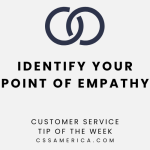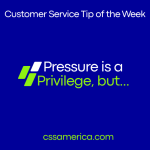When we’re criticized, we can get defensive, push back, deflect blame to others, and focus more on defending ourselves than really listening to what the other person is saying. And some of us who get defensive, once we allow our emotions to settle, take time to reflect on what the other person said. We sometimes are willing to see those kernels of truth. We are willing to learn from them and possibly make a change moving forward.
While it’s not great to be defensive, it’s often a natural reaction. It’s also a sign of maturity and wisdom to be able to overcome that initial defensiveness and try to get some lessons learned from what the other person said.
But what if we critiqued our own mistakes before the customer or co-worker complained? Not everything we do imperfectly or incorrectly or not on a timely basis or not in the best way possible is something that’s going to draw a complaint.
If you’re like me, you probably make little mistakes every single day.
We make many decisions every day, so it’s natural that some of those decisions are going to be wrong. The resulting action or inaction could be wrong.
Self-critiques that can lead to Self-improvement
But when we know in our gut or it’s clear based on some reaction/data/feedback that we didn’t do our best, we have to learn from our own mistakes:
- I really should have called that person back when I first thought about it.
- I knew I should have had somebody check my work before I moved it to the next step.
- I should have paused and thought through what might happen on that call before I responded to the customer.
- I really should have listened one more minute or asked one more question before sharing my thoughts.
- That meeting took a lot longer than it could have, and if I had just gone in a little bit more prepared, we probably would have ended on time.
- That would have gone much better if I stopped sending e-mails and just picked up the phone and called the person.
- That call would have been a lot cleaner if I would have looked away from the computer screen and focused totally on the caller.
If we make these comments to ourselves and put lessons learned into place, then maybe we would have fewer reasons for the co-worker or the customer to critique us. And if they did critique us, we probably would have already had that conversation with ourselves about a very similar issue, and we might understand their critique more because we heard it from ourselves first.
Therefore, we might not respond so defensively, we might not get so emotional, and we might actually understand where they’re coming from a lot sooner.
If you critique yourself before others do, the critiques of others won’t affect you as much.
Signup for FREE Tips! Contact Us More Resources for You Visit Our Home Page












